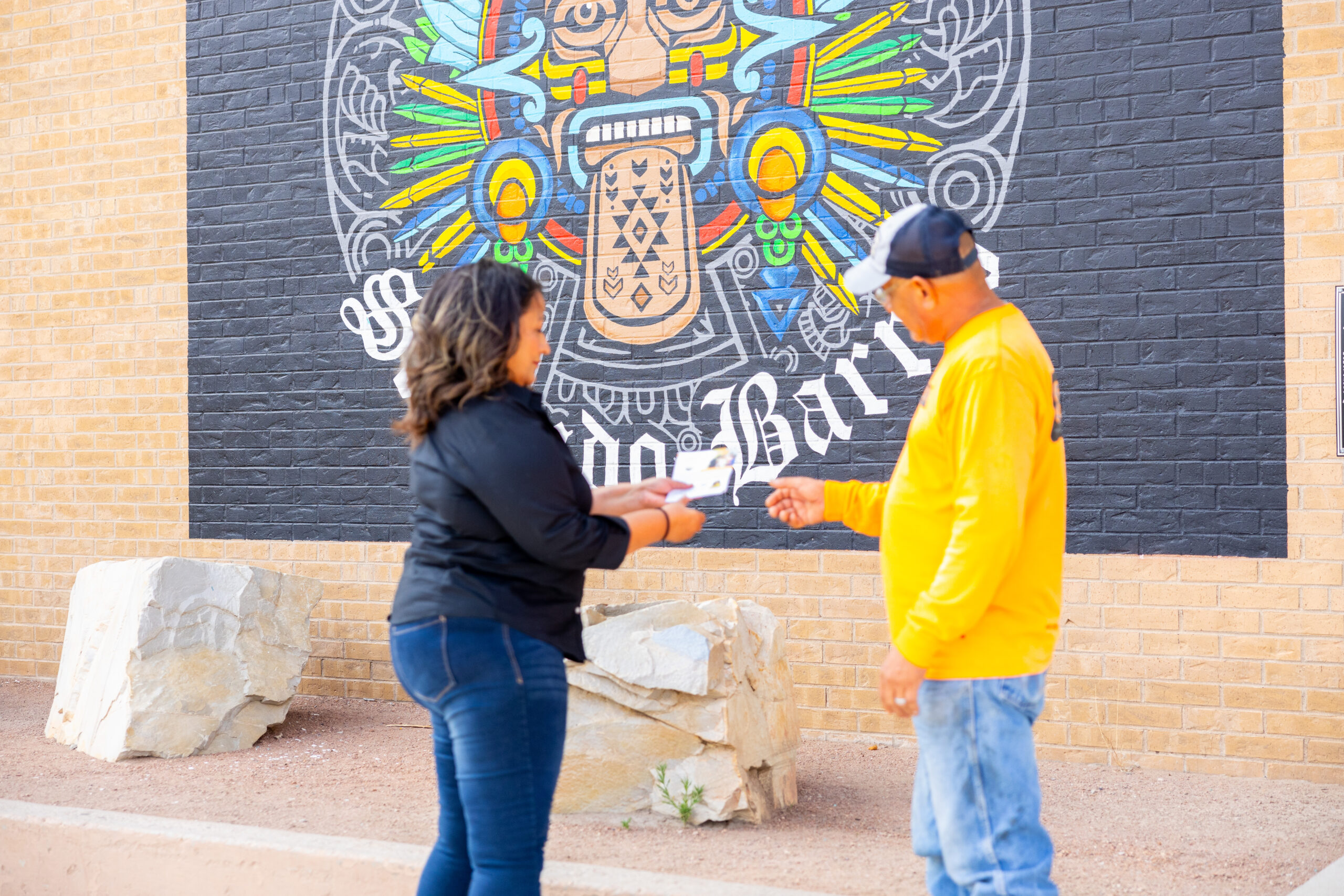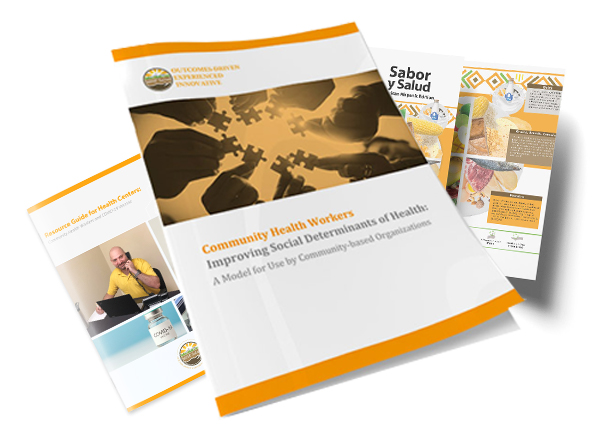Addressing Mental Health Experiences Among Subpopulations of Migrant Seasonal Agricultural Workers
A two-part article series that explores a CHW-driven community initiatives strategic response to identified mental health challenges that impact MSAWS
Person-Centered Mental Health Awareness
Mental health is more than ups and downs … it encompasses how we think, feel and behave, influencing how we manage stress, interact with others and make healthy choices.
It affects our emotional, psychological and social well-being. Everyone struggles with mental health challenges at some point – and it is important to know you are never alone. Mental health struggles can manifest in a multitude of ways; if you or someone you love experience or have been facing difficulties in any of the below areas for two weeks or more, it may be a sign that it is time to reach out for additional support: Changes in sleep patterns (trouble sleeping/sleeping more than usual)
- Changes in appetite, such as increased hunger or decreased interest in food, which may lead to unexpected weight gain or loss
- Struggling to get out of bed in the morning due to mood
- Difficulty concentrating
- Loss of interest in activities you usually enjoy
- Challenges completing everyday tasks
- Feelings of irritability, frustration or restlessness
Need Support? You are Not Alone!
If you or someone you care about needs help, reach out to the 988 Lifeline. It is free, confidential and available 24/7. Whether you call, text or chat, you will receive compassionate, judgment-free support.
Remember, talking to someone can be helpful – even life-saving. Reach out today!
Opening the Door to Conversations: Strategic Efforts by CHWs to support Mental Health Awareness
Because Community Health Workers (CHWs) possess a deep understanding of their community's needs, they are able to effectively address sensitive topics, such as mental health. Moreover, CHWs understand the cultural sensitivities – including any stigmas – that may accompany such a discussion, which is vital as they connect with individuals on a personal level, allowing them to fostering open conversations and support. (APHA, n.d.).
With strong roots in their communities, CHWs can engage in meaningful conversations that help develop strategies for reaching diverse populations, including MSAWs. Their role in addressing mental health disparities is essential, with an emphasis on strategic responses as they: (Barnett et al., 2018)
- Provide education on the signs and symptoms and guidance on when to seek help
- Create safe spaces for discussions about mental health
- Address mental health stigmas
- Connect the community with culturally appropriate resources
By creating safe spaces for open discussions about mental health, CHWs can encourage communities to RISE and overcome mental health disparities!
R.I.S.E:
- React/respond to mental health needs
- Increase awareness of mental health/suicide prevention resources
- Support safe spaces for mental health discussions
- Encourage/empower individuals to seek support
MSAW Lived Experiences
Migrant Seasonal Agricultural Workers (MSAWs) are individuals whose main job is in agriculture on a seasonal basis and who temporarily reside in a location for that work.
Due to the demanding nature of their work, MSAWs face multiple health challenges, as they are at increased risk for: (Rural Health Information Hub, 2024).
- Mental health struggles, such as depression, are also common, influenced by the stress of constant relocation and hardship.
- Exposure to environmental health hazards (e.g.., pesticides, extreme heat)
- Such exposure can lead to both physical and mental health challenges. As with many prolonged physical health challenges, this exposure can compound mental health struggles as MSAWs deal with such extremities for extended periods of time. Additionally, loved ones of MSAWs may begin to struggle with mental health as they watch their family member(s) endure the health effects of their working conditions (Goldman et al., 2021, pp. 50-51).
Person-Centered Care
When we adopt a person-centered care approach to mental health awareness, we learn to see the whole person.
Person-centered care ensures integrated health care services meet the needs, goals and preferences of individuals. This system encourages effective communication between providers and patients, empowering both to work together to create effective care plans (Centers for Medicare & Medicaid Services [CMS], n.d.).
Person-centered means we see the distinctive characteristics that make the person unique, including:
- Age and stage of life (infants, children, adolescents, adults, older adults)
- Cultural and racial backgrounds
- Gender identity
- Family roles (mother, father, sibling, grandparent, partner)
Understanding and embracing this approach enables health centers, clinical health teams, and community organizations to see MSAWs as unique individuals and appreciate who they are beyond their vocation. We Encourage Communities to R.I.S.E. Up!
- Pass it on: Share your mental health resources with others.
- Buddy up: Partner with peers to check in on each other's mental well-being. Ask friendly questions like "How's your day going?" or "How are you feeling today?"
- Share positivity: Give a smile, a laugh or some encouraging words!
- Be empathetic: Be understanding and kind; remind others (and yourself!) it's okay to ask for help!
Partner Spotlight: Share Your Success!
We want to hear your stories!
Tell us how you or a health center has successfully implemented CHWs to boost mental health awareness among MSAWs and diverse populations.
For insights on enhancing your Health Center's Community Health Worker program or integrating CHWs into your clinical team, reach out for Technical Training Assistance: nttap@mhpsalud.org.
References
Barnett, M. L., Gonzalez, A., Miranda, J., Chavira, D. A., & Lau, A. S. (2018). Mobilizing community health workers to address mental health disparities for underserved populations: A systematic review. Administration and Policy in Mental Health, 45(2), 195–211. https://doi.org/10.1007/s10488-017-0815-0
Centers for Disease Control and Prevention. (2024). Mental health. https://www.cdc.gov/mentalhealth/learn/index.htm
Centers for Medicare & Medicaid Services. (n.d.). Person-centered care. https://www.cms.gov/priorities/innovation/key-concepts/person-centered-care
Goldman, S., Aspenson, A., Bhatnagar, P., & Martin, R. (2021). Essential and in crisis: A review of the public health threats facing farmworkers in the U.S. Johns Hopkins Center for a Livable Future. https://clf.jhsph.edu/sites/default/files/2021-05/essential-and-in-_crisis-a-review-of-the-public-health-threats-facing-farmworkers-in-the-us.pdf
National Institute of Mental Health. (n.d.). Caring for your mental health. https://www.nimh.nih.gov/health/topics/caring-for-your-mental-health
National Suicide Prevention Lifeline. (n.d.). Get help. https://988lifeline.org/get-help/
Rural Health Information Hub. (2024). Migrant health. https://www.ruralhealthinfo.org/topics/migrant-health
American Public Health Association. (n.d.). Community health workers.





